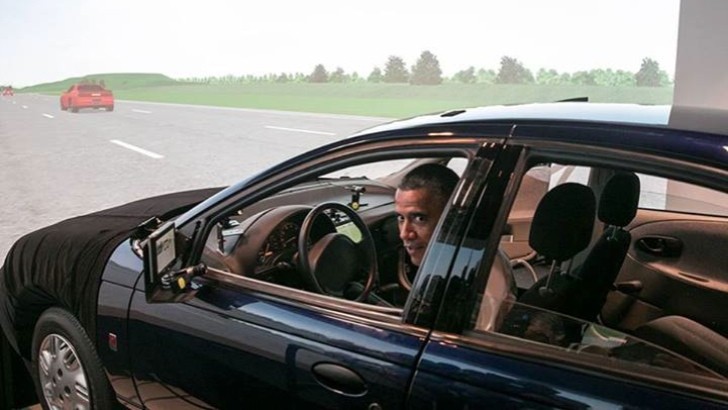U.S. President Barack Obama has recently toured the Turner-Fairbank Highway Research Center, a facility that focuses on new technologies that help make driving safer and smarter, located in McLean, Virginia. Before making a speech on how important investing in new infrastructure technologies and renewing the Highway Trust Fund is, the president drove a Saturn SL1 vehicle simulator.
Obama took the quick trip to one of the facilities that focusses on highway technologies, given that The Highway Trust Fund is in danger of running dry and the Congress so far failed to act. The president of U.S. talked about the importance of investing in new infrastructure technologies and important policies that would positively benefit millions of Americans.
“Transportation easts up more of the typical family’s household budget than anything except the rent or a mortgage,” Obama explained quoting a recent study. According to the president, funding infrastructure projects helps American families, fuels the economy and it better positions the entire country in the future. Obama already produced his own plan that, allegedly, would rebuild American infrastructure in a comprehensive and responsible way, but needs the Congress’ support to put in practice.
And what better way to prove his support of Virginia’s institute than actually driving the classic everyday car, the Saturn SL1, turned into a simulator. “As the father of a daughter who just turned 16, any new technology that makes driving safer is important to me" Obama explained.
In case you didn’t know, The Federal Highway Administration’s (FHWA) Office of Research, Development and Technology (RD&T) is located at the Turner-Fairbank Highway Research Center (TFHRC), a federally owned and operated national research facility in McLean, Virginia.
According to their website, the center houses more than 20 laboratories, data centers, and support facilities. Scientists conduct applied and exploratory advanced research in vehicle-highway interaction, nanotechnology, and a host of other types of transportation research in safety, pavements, highway structures and bridges, human-centered systems, operations and intelligent transportation systems, and materials.
“Transportation easts up more of the typical family’s household budget than anything except the rent or a mortgage,” Obama explained quoting a recent study. According to the president, funding infrastructure projects helps American families, fuels the economy and it better positions the entire country in the future. Obama already produced his own plan that, allegedly, would rebuild American infrastructure in a comprehensive and responsible way, but needs the Congress’ support to put in practice.
And what better way to prove his support of Virginia’s institute than actually driving the classic everyday car, the Saturn SL1, turned into a simulator. “As the father of a daughter who just turned 16, any new technology that makes driving safer is important to me" Obama explained.
In case you didn’t know, The Federal Highway Administration’s (FHWA) Office of Research, Development and Technology (RD&T) is located at the Turner-Fairbank Highway Research Center (TFHRC), a federally owned and operated national research facility in McLean, Virginia.
According to their website, the center houses more than 20 laboratories, data centers, and support facilities. Scientists conduct applied and exploratory advanced research in vehicle-highway interaction, nanotechnology, and a host of other types of transportation research in safety, pavements, highway structures and bridges, human-centered systems, operations and intelligent transportation systems, and materials.

